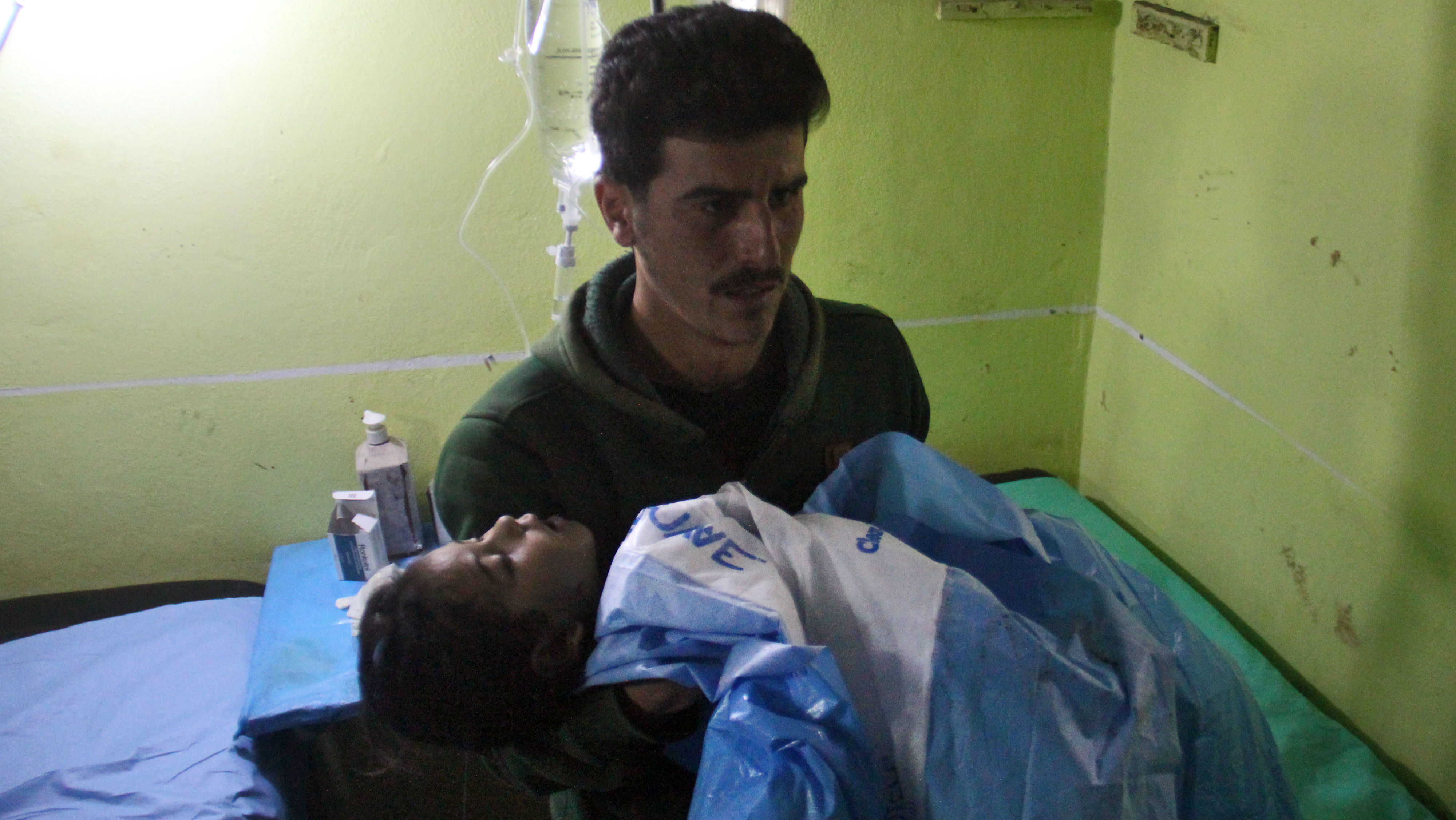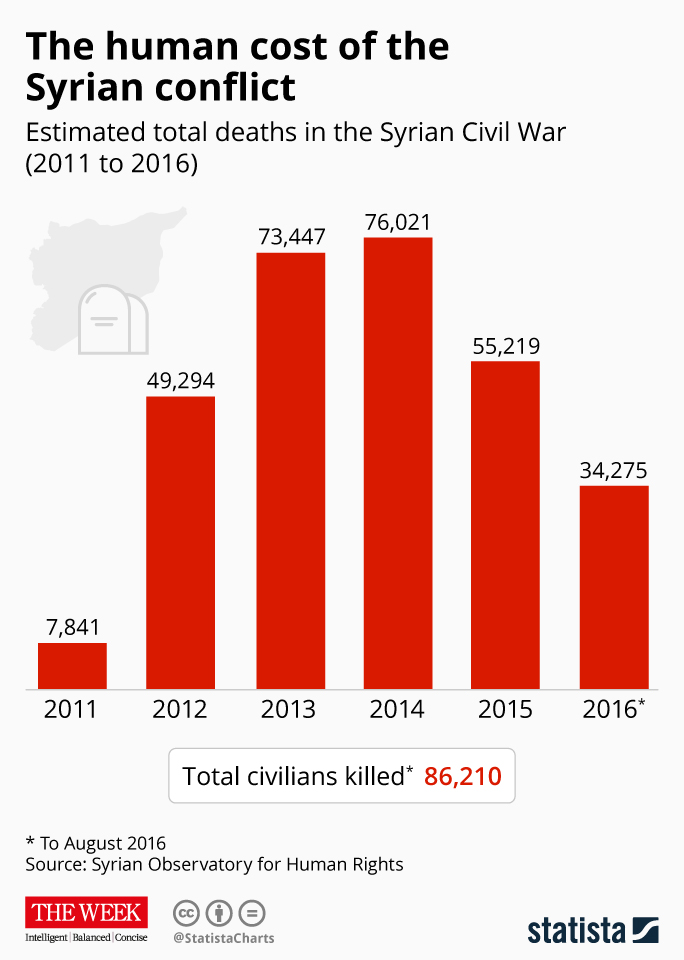Syria 'planning a new chemical attack', US claims
White House warns President Bashar al-Assad he will 'pay a heavy price' if strike goes ahead

A free daily email with the biggest news stories of the day – and the best features from TheWeek.com
You are now subscribed
Your newsletter sign-up was successful
Syria: Deadly attacks continue ahead of ceasefire
12 September
At least 91 people have been killed and dozens more injured in a spate of deadly air strikes in northern Syria, ahead of a planned ceasefire due to start today.
The UK-based Syrian Observatory for Human Rights monitoring group has said the rebel-held areas of Idlib in the northwest and Aleppo in the north were the hardest hit over the weekend.
The Week
Escape your echo chamber. Get the facts behind the news, plus analysis from multiple perspectives.

Sign up for The Week's Free Newsletters
From our morning news briefing to a weekly Good News Newsletter, get the best of The Week delivered directly to your inbox.
From our morning news briefing to a weekly Good News Newsletter, get the best of The Week delivered directly to your inbox.
The increased levels of violence have "deepened mistrust among Syrians that the ceasefire… will deliver on its promise to ground the government planes", the New York Times says.
The newspaper adds: "In any war, it is common for the parties to escalate attacks in the days or hours before a truce, and in this case the uptick was sharp."
The ceasefire was agreed after talks between Russia, which backs Syrian president Bashar al-Assad, and the United States, which has been supporting some of Syria's rebel groups in the ongoing conflict.

The terms of the ceasefire do not cover terrorist groups, such as Islamic State and Jabhat Fateh al-Sham, a former al-Qaeda affiliate, which will likely remain targets of both sides for the forseeable future.
A free daily email with the biggest news stories of the day – and the best features from TheWeek.com
Syrian rebel groups that are covered by the terms of the agreement have reportedly written to the United States to express their support for the ceasefire but remain concerned over the terms of the deal, as "the ceasefire was devoid of guarantees, monitoring mechanisms or sanctions against violations," The Guardian says. According to the rebels the absence of such mechanisms "allowed the government to scupper a previous deal".
US Secretary of State John Kerry announced the ceasefire on Saturday, telling media the agreement would "prevent Syrian President Bashar Assad's air force from flying combat missions anywhere the opposition is present", calling that provision the "bedrock of the agreement".
Infographic by www.statista.com for TheWeek.co.uk.
Syrian forces 'drop chlorine' on Aleppo
7 September 2016
Syrian government forces have been accused of using chemical weapons, after witnesses reported government helicopters dropping "barrel bombs containing chlorine" on a crowded neighbourhood of Aleppo.
A medical report from a hospital in the besieged eastern part of Aleppo said "at least 71 people, including 37 children and 10 women, were treated for breathing difficulties, dry cough" and that "their clothes smelled of chlorine".
The reports have not been independently verified. However, the BBC says that a Syrian Civil Defence rescue worker, Ibrahem Alhaj, "reached the scene of the attack shortly after a helicopter dropped barrels containing what he said were four chlorine cylinders".
"Most of those injured were women and children. It is a crowded neighbourhood," said Alhaj.
Rami Abdurrahman, chief of the Britain-based Syrian Observatory for Human Rights, confirmed to The Guardian that a number of people were treated for breathing difficulties after the barrel bomb attack, but "could not ascertain if it was chlorine gas".
It is not the first time that observers have reported the use of chemical weapons during the ongoing conflict.
Syrian government forces were responsible for two toxic gas attacks in 2014 and 2015 involving the use of chlorine, according to an inquiry last month by the UN and the Organisation for the Prohibition of Chemical Weapons.
The Syrian government continues to strongly deny the allegations of chemical weapon attacks.
Image of injured boy a symbol of the horrors of Syrian conflict
18 August
Syrian activists have released a haunting image of a young boy injured by an airstrike on a rebel-held area in eastern Aleppo.
Five-year-old Omran Daqneesh is seen sitting alone in an ambulance, covered in dust, bleeding heavily from a head injury and in a state of shock. In a video, he touches the blood running down his face, wipes it on his seat, but does not cry.
"The stunned, bloodied face of a child survivor sums up the horror of Aleppo," says Adib Shishakly, a member of the opposition Syrian National Council.
Omran was one of several children pulled from the rubble following the attack on the Qaterji neighbourhood, which was carried out by either Syrian or Russian military. He has since been discharged from hospital.
"The horror generated by the image echoes the anguished global response to the pictures of Alan Kurdi, the drowned Syrian boy who came to encapsulate the horrific toll of Syria's civil war," says AP.
Photojournalist Mahmoud Raslan, who captured the image, said he helped carry three lifeless bodies from the debris before finding Omran.
The image has since gone viral, with people from around the work expressing their shock and sadness at the image and the ongoing war - but also questioning whether a photo can ever change anything.
Fighting has escalated in Aleppo once again, with forces loyal to President Bashar al-Assad and Russian military jets bombarding rebels in the east, reportedly leaving hundreds dead, many of them civilians.
"Tomorrow there will, no doubt, be more strikes and more children like Omran will be hurt," says the Daily Telegraph's Middle East correspondent Raf Sanchez.
Syria: Suspected chlorine attack kills four in Aleppo
11 August
At least four people have died and many more suffered breathing difficulties during a suspected chlorine attack on a rebel-held neighbourhood of Aleppo, in Syria, say medics.
Hamza Khatib, the manager of Al Quds hospital in the city, told Reuters they had recorded four deaths and 55 injuries from gas poisoning.
Syria Civil Defence, a neutral group of volunteers operating in rebel-held territory, said that a chemical barrel had fallen on the Zubdiya neighbourhood of the city.
Both government and opposition forces have denied using chemical weapons during the conflict, although President Bashar al-Assad's forces have been accused of chlorine and other chemical attacks.
The Syrian government and Russia have continually claimed the rebels are using poison gas.
The suspected chlorine attack comes after doctors in the rebel-held eastern section of the city published an open letter to the US asking it to intervene to stop the bombardment of hospitals by the Russian-backed Syrian air force.
“We do not need tears or sympathy or even prayers: we desperately need a zone free from bombing over eastern Aleppo to stop the attacks, and international action to ensure Aleppo is never besieged again," they wrote.
The letter urged President Barack Obama "to act now to stop the bombs that continue to fall on the city and ensure they are never held under siege again".
Yesterday, General Sergei Rudskoi, a senior Russian defence ministry official, said military action would be suspended between 10am and 1pm to allow for humanitarian aid to reach the city.
However, asked by Reuters at 10.45am today whether the ceasefire had taken effect, Mohammed Rasheed, a spokesman for the rebel Jaish al-Nasr group, said: "No, on the contrary.
"Since the morning there has been a [government] attempt to advance in the Ramousah area. There has been a big escalation by Russian warplanes."
Islamic State suffering 'considerable setbacks'
31 May
Islamic State is suffering "considerable setbacks" and could be defeated by the end of the year by a concerted military push across Iraq and Syria, a top commander in the Peshmerga told Sky News.
The military force, which comprises Iraqi Kurds, has retaken several important villages around the terrorist group's Mosul stronghold in northern Iraq over the last few days.
General Salar Taymour, a commander in the elite Zerevani unit, told Sky News that IS "can be defeated over the next few months but the Peshmerga need more help".
IS's strategy is to "brainwash their fighters to make them think they'll go to heaven", he added, but said: "We are not frightened by them anymore; they can be stopped."
Special forces from the UK, the US and Canada have already been helping the Kurds to prevent attacks by IS.
Sky News reporter Alex Rossi, who is embedded with the Peshmerga, described the fighters as a "capable ally of the West in a fight where local boots are needed on the ground".
IS positions were "crushed by punishing airstrikes and coordinated Peshmerga attacks", he added: "But liberating the IS stronghold of Mosul will be much harder."
Iraq's second-largest city is well-defended, "with hundreds of thousands of civilians who can be used as human shields", says Rossi.
The operation to liberate Mosul has been months in the making and involves coordination between Iraq's military, Kurdish forces and the international coalition, reports CNN.
Meanwhile, Iraqi special forces have launched an assault on another IS stronghold, Fallujah, which lies 400 miles to the south of Mosul. Across the border in Syria, US-backed Kurdish and Arab forces also pushed into territory north of Raqqa, the terror group's de facto capital, last week.
-
 The ‘ravenous’ demand for Cornish minerals
The ‘ravenous’ demand for Cornish mineralsUnder the Radar Growing need for critical minerals to power tech has intensified ‘appetite’ for lithium, which could be a ‘huge boon’ for local economy
-
 Why are election experts taking Trump’s midterm threats seriously?
Why are election experts taking Trump’s midterm threats seriously?IN THE SPOTLIGHT As the president muses about polling place deployments and a centralized electoral system aimed at one-party control, lawmakers are taking this administration at its word
-
 ‘Restaurateurs have become millionaires’
‘Restaurateurs have become millionaires’Instant Opinion Opinion, comment and editorials of the day
-
 Epstein files topple law CEO, roil UK government
Epstein files topple law CEO, roil UK governmentSpeed Read Peter Mandelson, Britain’s former ambassador to the US, is caught up in the scandal
-
 Iran and US prepare to meet after skirmishes
Iran and US prepare to meet after skirmishesSpeed Read The incident comes amid heightened tensions in the Middle East
-
 Syria’s Kurds: abandoned by their US ally
Syria’s Kurds: abandoned by their US allyTalking Point Ahmed al-Sharaa’s lightning offensive against Syrian Kurdistan belies his promise to respect the country’s ethnic minorities
-
 Israel retrieves final hostage’s body from Gaza
Israel retrieves final hostage’s body from GazaSpeed Read The 24-year-old police officer was killed during the initial Hamas attack
-
 China’s Xi targets top general in growing purge
China’s Xi targets top general in growing purgeSpeed Read Zhang Youxia is being investigated over ‘grave violations’ of the law
-
 Syria’s Islamic State problem
Syria’s Islamic State problemIn The Spotlight Fragile security in prison camps leads to escape of IS fighters
-
 Panama and Canada are negotiating over a crucial copper mine
Panama and Canada are negotiating over a crucial copper mineIn the Spotlight Panama is set to make a final decision on the mine this summer
-
 Why Greenland’s natural resources are nearly impossible to mine
Why Greenland’s natural resources are nearly impossible to mineThe Explainer The country’s natural landscape makes the task extremely difficult